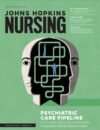The irresistible attraction of excellence
By Jennifer L.W. Fink
Sarah Afonso moved to Baltimore from Florida because she wanted to work in a progressive environment that valued nurses. That’s exactly what she found at The Johns Hopkins Hospital, a Magnet-designation institution since 2003.
Created in the 1990s by the American Nurses Credentialing Center, Magnet designation underscores the link between great nursing care and excellent patient outcomes. To get (and maintain) Magnet designation, a hospital must involve nurses in all levels of decision-making. It must achieve excellence. And it must constantly strive to improve patient care.
[pullquote]
“At Hopkins, our bedside nurses are looking at evidence-based practice; they’re using best practices every day to improve patient outcomes. They’re not just being told what to do; they’re at the table, contributing to clinical decisions and standards of practice.”
[/pullquote]
Afonso noticed the impact of Magnet designation almost immediately. “Coming to work at Hopkins was like fast-forward from all of the nursing environments I’d seen in nursing school, in terms of how empowered the nurses are,” says Afonso, MSN, RN, a radiation oncology nurse and Magnet Ambassador.
“Every nurse here is involved in committees that are geared toward creating better working environments and better patient care,” says Stephanie Wilmer, MSN, RN, nursing coordinator for the Magnet Program. “At Hopkins, our bedside nurses are looking at evidence-based practice; they’re using best practices every day to improve patient outcomes. They’re not just being told what to do; they’re at the table, contributing to clinical decisions and standards of practice.”
Because Magnet hospitals value nurses’ insights and education, they create schedules that allow nurses to be actively involved in process and practice improvement. At Hopkins Hospital, committee time is built into nurses’ work schedules to improve patient care and workflow.
Paid time away from the bedside is not typical at non-Magnet institutions. In many hospitals, directives and initiatives come from the top, with little nursing involvement. Not so at Hopkins. Because Hopkins is a Magnet facility, nurses are involved in every major initiative. Currently, bedside nurses are providing feedback to IT personnel regarding the new electronic health records.
“We have nurses helping to build the system so it is friendly for nurses, physicians, and other care providers,” Wilmer says. “We have nurses who are saying, ‘It’s taking too long to put in one vital sign. How we can make this work better?’”
Nurses at all levels have the opportunity to improve practice and patient care, Afonso says, and that matters to nurses who care deeply about their patients and profession.
“Magnet designation is about sharing best practices,” Wilmer says. “It allows us to assess our nursing practice and make changes to our practice that are evidence-based, and that helps us attract and retain clinicians. People know that their patients are going to get the best care possible here.”

